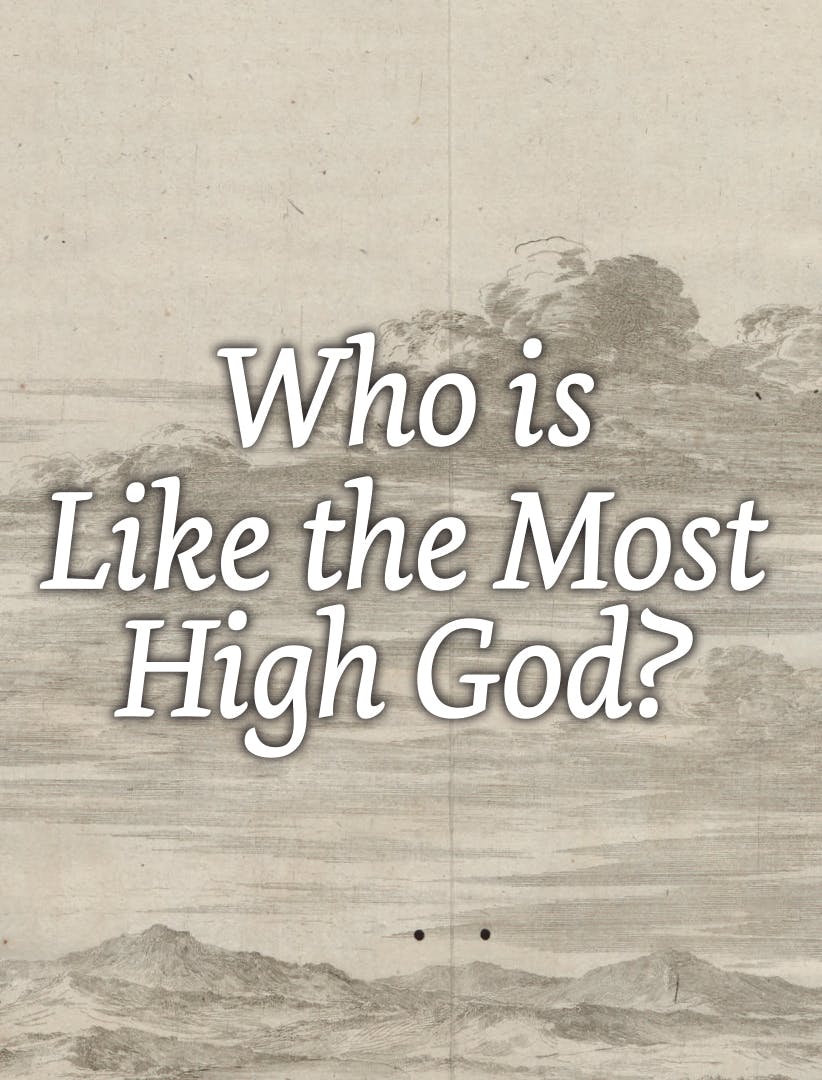Who is Like the Most High God?

DOWNLOAD PDF VERSION
“Come, let us build for ourselves a city, and a tower whose top will reach into heaven, and let us make for ourselves a name, otherwise we will be scattered abroad over the face of the whole earth” (Gen. 11:4).
These are the boastful words the descendants of Noah uttered before they began constructing an enormous edifice as a monument to their greatness, a shrine that would also connect heaven and earth in a unified attempt to bring God down to their level.
Seeking Wisdom from Above
Like the people of Babel, the ancient Sumerians (5000 BC–1800 BC) had their eyes fixed on the heavens. Throughout the ages, many civilizations have been fascinated by the heavens, planets and stars, believing the celestial bodies to be inhabited realms of gods and goddesses; a cosmic, polytheistic host!
Sumerian mythology and practice believed that there was a way to receive special revelation from the gods. Sumer had priestly castes, learned experts who specialized in magic arts, sorcery, astrology, oracle divination and channeling spirits (gods) to gain mystical knowledge that would benefit their lives on earth.
Ziggurats, or stepped pyramids, were constructed throughout the cities of Sumerian territory known as Mesopotamia. One of the chief purposes of these constructions was to create a portal at the top of the ziggurat for a summoned deity to descend from heaven to earth and meet the Sumerian priests. In this sacred portal (house), the summoned god(s) could instruct the pagan priests concerning agriculture, war, submission to or appeasement of a particular god, warnings of doom or curses for inappropriate behavior.

Once contained in the portal, the Sumerian priests had a sense of “control” of the deity, and in an obsessive, human quest to control their world, receive foreknowledge about the future. The ancient pagan mind lacked hope for the future and knew nothing of love between gods and humans. Beyond appeasement of the god(s), they were abandoned in a violent, chaotic and unstable world.
Summoning the Gods
Every ziggurat displayed the dominance and arrogance of a particular Sumerian ruler. It had societal functions, but also sought to curry favor from the gods to be bestowed upon the ruler and his city, thus serving as a monument of the ruler’s power. Rulers believed they could summon gods from heaven, wield influence upon them through the priestly caste and thus gain more prestige for themselves (Prov. 16:18). The words of Nebuchadnezzar echo this arrogant tune, “Is this not Babylon the great, which I myself have built as a royal residence by the might of my power and for the glory of my majesty” (Dan. 4:30)? We can also recall the pride of Herod followed by his demise when he accepted praise from the people, “The voice of a god and not of a man” (Acts 12:22).
In Dr Jordan Peterson’s book, We Who Wrestle with God, the purpose of the ziggurat is unpacked, describing the human function of reaching to gods above in the heavens and how the human desire to connect with deities is a universal one. Peterson connects the ziggurat with human pride when he states: “They were primarily monuments to the grandeur of grandiosity of a given ruler, or in a more generous interpretation, his society. The higher the ziggurat, the grander the potentate—and, by inference—the more intimidating his policy.”
In The Sacred and the Profane, Mircea Eliade describes the Sumerian ziggurat as a “literal cosmic mountain,” with the top being the “Mountain of the House,” “Mountain of Storms” and “Link between Heaven and Earth.” Many scholars believe the ziggurat could have been a copy of the Tower of Babel and influenced Sumerian mythology.
The ancient Egyptians also built massive pyramidal structures which dwarfed the ziggurat in what Peterson describes as an attempt to, “elevate the status of their pharaohs to near-godly levels.” Despite their other functions, he explains, these towers, ziggurats and pyramids always opened the door to, “pathological…worship of a false god—putting in the place of the functional and truly integrating divine ideal something proximate, self-serving, arrogant, power-mad, and prideful.”
This is indeed the epicenter of the pagan heart, a temple to man, self-worship and setting up humankind as God. “The wicked plots against the righteous and gnashes at him with his teeth. The Lord laughs at him, for He sees his day is coming” (Ps. 37:12–13).
The Futility of Human Pride
One of my favorite sonnets, “Ozymandias,” ironically drives home this point. Percy Shelley published this powerful sonnet on January 11, 1818, after studying the writings of Greek historian, Diodorus Siculus (1st century BC) alongside fellow poet Horace Smith. Diodorus’s work reflected on the ruins of ancient Egypt, describing the broken remains of statues and monuments to pharaohs long past. Shelley and Smith each created a sonnet where they replaced the name of Pharaoh Ramses II with Ozymandias.
Here is Shelley’s poem.
I met a traveler from an antique land,
Who said: Two vast and trunkless legs of stone
Stand in the desert. Near them, on the sand,
Half sunk, a shattered visage lies, whose frown,
And wrinkled lip, and sneer of cold command,
Tell that its sculptor well those passions read,
Which yet survive, stamped on these lifeless things,
The hand that mocked them, and the heart that fed:
And on the pedestal these words appear:
“My name is OZYMANDIAS, King of Kings.”
Look on my works, ye Mighty, and despair!
Nothing beside remains. Round the decay
Of that colossal wreck, boundless and bare
The lone and level sands stretch far away.
It is a fitting poem when we consider the Tower of Babel alongside empires like Egypt, Assyria, Babylon and Rome. All have a common theme: the state of man’s heart. When humans give in to pride and arrogance, they can see nothing but a monument erected to the so-called glory of their name. In that moment, mankind allows deception to take hold and falls into the trap of believing their glory will outlast eternity, such as the fabled Ozymandias, who fell prey to the false glory of human arrogance. However, reality is always a stark reminder that man is finite, and there is only one true God whom the Bible clearly reveals.
When God Came Down
This is what the people of Babel missed. They rejected the God-given command to “be fruitful and multiply” (Gen. 1:22, 9:1) and tried to master their own destiny by setting God up to be equal to them. They foolishly believed they could bring God down to their level and so conquer or reduce Him. What happened is incredible. After observing the rebellion of men and their genius, creative capabilities which He had given them (Gen 1:26), God actually did come down (Gen. 11:7). Yet His “heavenly descent” was not to give humanity mystical knowledge and certainly not to become an equal. Instead, He came to punish them. God scattered the obsessive tower-builders by confusing them with many languages (Gen. 11:9). With the monolingual unifying factor obliterated, the people failed to cooperate and abandoned their project of reaching the heavens and finishing the city (Gen. 11:8).
The Hebrew word balal means to “confuse” or “mix up.” However, Peterson notes, “Babel and Babylon are clearly related terms of etymology and geography, derived as they arguably are from the Akkadian word Babili(m), which means ‘gate of the god.’” This is fitting as both Babel and Babylon, as much as they were literal cities, act as biblical motifs of man’s arrogance, pride and worldliness (see Rev. 17:5).

God Is Master of the Earth
Despite the pride of man (Prov. 29:23), the Bible reveals God as both the God of the world and the God of Israel. God is the creator of the earth (Gen. 1:1) and calls His worldly creation “good.” After the Flood, which cleansed the earth of man’s evil, God reconnected Himself with man and a renewed creation with the sign of the rainbow (Gen. 9:16–17). God chose a man called Abram and promised to build an elected, covenantal nation through him. He also promised to bless all the families of the earth through this covenant (Gen. 12:3). Abraham’s declaration to the King of Sodom speaks to God being master of the earth, “Lord God Most High, possessor of heaven and earth” (Gen. 14:22).
Moses revealed God’s absolute sovereignty to the people of Israel, “He is God in heaven above and on the earth below; there is no other” (Deut. 4:39). Psalm 47:7 calls God the” King of all the earth.” At the birth of Jesus (Yeshua), the angels sang, “Glory to God in the highest, and on earth peace among men with whom He is pleased” (Luke 2:14, cf. Ps. 57:5). In the city of Athens, Paul confronts the people concerning an idol to an Unknown God. “The God who made the world and all things in it, since He is Lord of heaven and earth, does not dwell in temples made with hands; nor is He served by human hands, as though He needed anything, since He Himself gives to all people life and breath and all things” (Acts 17:24–25).
God of Israel
However, God is also the God of Israel. King David proclaimed, “And what one nation in the earth is like Your people Israel, whom God went to redeem for Himself as a people to make You a name…For Your people Israel You made Your own people forever, and You, O Lord, became their God” (1 Chron. 17:21–22; cf. Deut. 7:6). God is described as “the God of the Hebrews” (Exod. 3:18), and Moses calls Him the “God of Israel” when he confronts Pharaoh (Exod. 5:1). The most important declaration in Judaism, the Shema, rallies Israel to “hear” (obey) because “the Lord is our God, the Lord is one!” (Deut. 6:4). Joshua attributes his military success to the God of Israel (Josh. 10:24–25), and this same title is attached to the inheritance of the tribe of Levi (Josh. 13:14). Deborah’s song reflects on the power of God’s covenantal nature at Sinai (Judg. 5:5; cf. Ps. 68:8). Psalm 41:13 and 106:48 describe the God of Israel as from “everlasting to everlasting.” Strength and power emanate from the God of Israel (Ps. 68:35) as He works wonders (Ps. 72:18) and avenges foes (Isa. 1:24).
This is radical language during a day where all nations believed in a plethora of gods that controlled regions and cities. Jewish scholar, Michael Wyschogrod, points to the uniqueness of the God of Israel when he writes, “There are many kings as there are many gods because the authority of each was restricted to a given territory. To leave that territory is to leave the jurisdiction of the god reigning over the territory. The command to Abraham to leave his land to go to a land which God will show him reveals a God whose sovereignty is not limited to one territory but one who is the God of Abraham in Ur of Chaldea and in Canaan and everywhere else that Abraham will visit. Such an international divine jurisdiction is unprecedented.”
The God of Israel is likened to a Husband towards Israel (Isa. 54:5–7) and His covenantal fidelity knows no bounds (Jer. 31:33). The people marvel at the miracles of Jesus and “they glorified the God of Israel” (Matt. 15:31). When Paul preached in Pisidian Antioch concerning why he believed Jesus was the Messiah, he outlined his foundational argument as being cemented in the covenantal relationship between God and Israel (Acts 13:16b–17).
Everlasting Faithfulness of God
Without a doubt, we see God working in extraordinary ways upon this earth, the nations and His unique covenantal faithfulness with Israel. His word is literally being fulfilled before our very eyes (Jer. 16:14–17) as He restores the Jewish people to their ancient, ancestral homeland. He does this not for Israel’s sake, but for the sake of His Holy Name (see Ezekiel 36:22–28; cf. Gen. 15, Ps. 105:7–11). With steadfast love (chesed) He maintains covenant, both for Israel and those grafted in (see Rom. 11), a relationship in which the “gifts and calling of God are irrevocable” (Rom. 11:29). This everlasting faithfulness of the God of Israel, who is God of the world, will never be brought low by the pride of man. One day, all the “towers of Babel” that have been erected throughout this world will crumble into dust under the King’s feet.
Related Resources

Discover Your Purpose and God’s Heart For You
In today's divided, turbulent world, it's essential for the Church to rediscover God's heart. Our free e-book, authored by a seasoned expert with three decades of experience in Israel, delves deep into the teachings of Jesus (Yeshua) to reveal God’s principles of love and purpose. Learn how embracing these truths can bring significance and impact to your life, even amidst chaos. Subscribe now to receive your free copy and embark on a journey of transformation.




